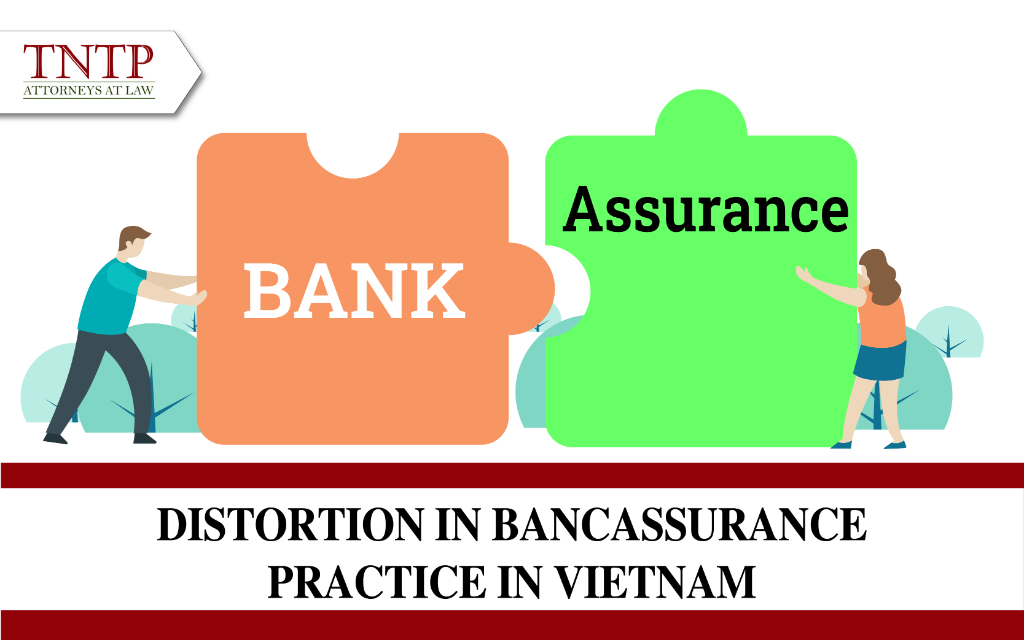Bancassurance activities in Vietnam are currently experiencing rapid growth and have become the main source of revenue for many large banks in the country. However, in recent times, Bancassurance activities have been raising several issues that cause harm to insurance buyers, specifically through the practices of insurance salespeople who engage in coercion and provide incomplete information to gain the trust of customers for contract signing. Is Bancassurance in Vietnam undergoing negative transformations? Let’s explore this issue with TNTP’s lawyer in the following article.
1. What is Bancassurance?
Bancassurance is a term combining “Banking” and “Assurance.” It is a business collaboration between an insurance company and a bank to create a distribution channel for shared products and services between insurance and banking for customers. Currently, in Vietnam, instead of solely providing traditional banking products and services such as savings, credit, and asset management, banks participating in Bancassurance also offer insurance products such as life insurance, health insurance, car insurance, and various other types of insurance provided by their partner insurance companies.
2. The Nature of Bancassurance
Bancassurance brings benefits to both banks and insurance companies. For banks, this service provides a relatively large source of revenue and attracts new customers through insurance services. At the same time, it enhances the relationship between the bank and its existing customers as the bank can simultaneously provide financial services along with diverse insurance services. As for insurance companies, Bancassurance expands their customer reach and helps increase insurance sales, while also enabling insurance companies to access the bank’s customer base, penetrate the market, and provide insurance products to bank customers.
The value of Bancassurance for customers with service needs cannot be overlooked. Customers can easily access both banking and insurance services in one place, saving time and effort in researching and purchasing various financial products. More importantly, customers can receive special benefits when using Bancassurance services between affiliated banks and insurance companies.
Therefore, the nature of Bancassurance is not inherently bad. However, currently, there are emerging distortions in Bancassurance that have caused dissatisfaction and even outrage among customers.
3. Distortions in Bancassurance Activities in Vietnam
a) Advisors disregarding customers to secure contract signing
Due to the pressure of meeting insurance sales targets and the high commission levels, insurance salespeople often disregard any means or methods to “tempt” customers into signing contracts. In many cases, advisors only provide favorable information, and attractive policies, and are willing to overlook payment terms or unilateral termination clauses that may be disadvantageous. Moreover, insurance contracts contain a vast amount of content that can extend to hundreds of pages, making it difficult for customers to review all the details and instead have to rely on the advice of insurance agents. This further exposes customers to risks if the advisors are not acting in their best interest.
b) Bank savings being converted into life insurance
In recent months, there have been numerous cases where customers who deposited money into bank savings accounts were later advised to purchase a product that is a combination of a bank and insurance company offers. Bank employees advised customers that this is a high-interest investment savings package that also includes life insurance. Customers trusted the advice and believed that the life insurance package was included as an additional service alongside their primary savings account. However, after signing the contract, customers discovered that the nature of the contract was completely different from what was advised, and it contained several highly unfavorable terms and conditions.
Specifically, bank employees provided misleading advice and misrepresented the concept, leading customers to misunderstand the service they were entering into. Customers thought they were making savings deposits, but in reality, they were participating in an insurance policy. If customers decide to terminate the contract and stop paying premiums, they would lose the entire amount they had “deposited” previously. However, the period of time that customers have to continue participating in the insurance can extend from a few years to several decades, depending on the contract terms.
According to legal regulations, intentionally providing false information to deceive customers into entering contracts can be subject to criminal liability for the offense of misappropriation of assets through abuse of trust, as stipulated in the Penal Code. Therefore, depending on the severity of the violation, individuals involved in such actions can face penalties ranging from six months to 20 years of imprisonment.
The above is an article by TNTP lawyers on the topic of ” Distortion in Bancassurance practices in Vietnam”. We hoped that this article will bring value to readers.
Sincerely,







